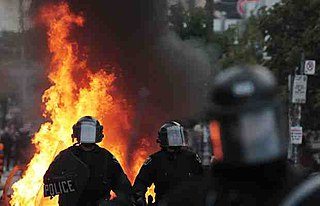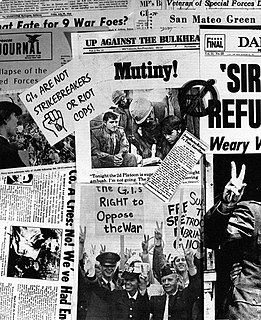 W
WThe 1968 Red Square demonstration took place in Moscow on 25 August 1968. It was a protest by eight demonstrators against the invasion of Czechoslovakia on the night of 20–21 August 1968 by the Soviet Union and its Warsaw Pact allies, crushing the Prague Spring, the challenge to centralised planning and censorship by liberal Communist leader Alexander Dubček.
 W
WThe 2014 anti-war protests in Russia refers to a series of anti-war demonstrations opposing the Russian military intervention in Ukraine that took place in Russia in 2014. Protesters held two anti-war protest rallies on 2 and 15 March 2014. The latter, known as the March of Peace, took place in Moscow a day before the Crimean referendum. The protests have been the largest in Russia since the 2011–13 Russian protests by the Russian opposition against the alleged electoral fraud committed by United Russia during the 2011 Russian legislative election. Reuters reported that around 20,000 people participated in the 15 March demonstrations.
 W
WAn Act of Conscience is a 1997 documentary film by Robbie Leppzer about the war tax resistance of Randy Kehler and Betsy Corner and years-long struggle that ensued after the IRS seized their home in Colrain, Massachusetts in 1989, to recover $27,000 in unpaid taxes, penalties, and interest. The film premiered at Sundance Film Festival and was shown on Cinemax and the Sundance Channel. It is narrated by Martin Sheen and features cameo appearances by activist-priest Daniel Berrigan and political folksinger Pete Seeger.
 W
WThe counterculture of the 1960s was an anti-establishment cultural phenomenon that developed throughout much of the Western world between the mid-1960s and the mid-1970s. The aggregate movement gained momentum as the U.S. Civil Rights Movement continued to grow, and, with the expansion of the American Government's extensive military intervention in Vietnam, would later become revolutionary to some. As the 1960s progressed, widespread social tensions also developed concerning other issues, and tended to flow along generational lines regarding human sexuality, women's rights, traditional modes of authority, experimentation with psychoactive drugs, and differing interpretations of the 'American Dream'. Many key movements related to these issues were born or advanced within the counterculture of the 1960s.
 W
WThe 2009 G20 London summit protests occurred in the days around the 2 April 2009 G20 London summit. The summit was the focus of protests from a number of groups over various long-standing and topical issues. These ranged from disquiet over economic policy, anger at the banking system and bankers' remuneration and bonuses, the continued war on terror and concerns over climate change.
 W
WPublic protesting and demonstrations began one week ahead of the 2010 G20 Toronto summit, which took place in Toronto, Ontario, Canada on 26−27 June. The protests were for various causes, including poverty and anti-capitalism.
 W
WHomecoming: When the Soldiers Returned From Vietnam is a book of selected correspondence published in 1989. Its genesis was a controversial newspaper column of 20 July 1987 in which Chicago Tribune syndicated columnist Bob Greene asked whether there was any truth to the folklore that Vietnam veterans had been spat upon when they returned from the war zone. Greene believed the tale was an urban legend. The overwhelming response to his original column led to four more columns, then to a book collection of the most notable responses.
 W
WSignificant opposition to the Iraq War occurred worldwide, both before and during the initial 2003 invasion of Iraq by a United States-led coalition, and throughout the subsequent occupation. People and groups opposing the war include the governments of many nations which did not take part in the invasion, and significant sections of the populace in those that did.
 W
WThe war in Afghanistan prompted large protests around the world, with the first large-scale demonstrations beginning in the days leading up to the war's official launch on October 7, 2001.
 W
WDraft evasion in the Vietnam War was a common practice in Australia and the United States. Significant draft avoidance was taking place even before the U.S. became heavily involved in the Vietnam War. The large cohort of Baby Boomers allowed for a steep increase in the number of exemptions and deferments, especially for college and graduate students. According to peace studies scholar David Cortright, more than half of the 27 million men eligible for the draft during the Vietnam War were deferred, exempted, or disqualified.
 W
WThe term G.I. movement refers to resistance to military involvement in the Vietnam War from active duty soldiers in the United States military. Within the military popular forms of resistance included combat refusals, fragging, and desertion. By the end of the war at least 600 officers were killed in fraggings, over 300 refused to combat and approximately 50,000 American servicemen deserted. Along with resistance inside the U.S. military, civilians opened up various GI Coffeehouses near military bases where civilians could meet with soldiers and could discuss and cooperate in the anti-war movement.
 W
WOpposition to United States involvement in the Vietnam War began with demonstrations in 1964 against the escalating role of the United States in the Vietnam War and grew into a broad social movement over the ensuing several years. This movement informed and helped shape the vigorous and polarizing debate, primarily in the United States, during the second half of the 1960s and early 1970s on how to end the war.